| FINAL PAPER PROMPTS |
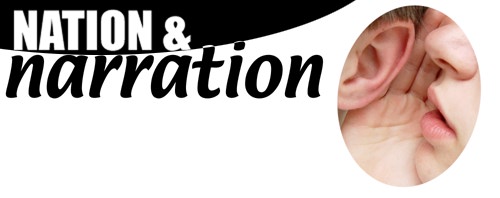
CLT 210:Nation & Narration: An Introduction to Comparative
Literature | Professor Willliam Nericcio | Tuesdays, 3:30-6:10pm in Hepner Hall 210
Course Description
Greatest hits! Cultural Studies! Gender Studies! Everything but
the Kitchen Sink! Our introduction to Comparative Literature will NOT,
REPEAT, WILL NOT clarify the boundaries of Comparative Literature; in
fact, it is our sublime hope that students will leave this class
convinced that Comparative Literature is more process than product,
more wave than stone, more explosive than sedentary. If anything,
you can think of this experiment as a four-month odyssey guided by an
oddly rigorous, eclectic wandering or, alternatively, as a months-long
exercise in aesthetic and literary seduction.
Part of this is owing to the course design: each weekly gathering
features a different Professor and a different text--around these
parts, the CLT 210 is known as the test-drive-a-professor
seminar. The variety does not stop there, as some of our dynamic
roster of scholars are not ONLY from the Department of English and
Comparative Literature--we will draw our cohort of outstanding
professors from across the College of Arts and Letters. The most
delicious aspect of Comparative Literature as a "field" or
"fields" is that it supports aesthetic, intellectual and cultural
investigations that cross geographic and institutional
boundaries--hence the thematic interest of thiscourse/lecture series in
Nation and Narration; additionally it is that branch of literary
study most deeply invested in the collaborations that occur
between
literature and the "sister arts."
So it is that Philosophers, Historians, Editors, Poets, Native American
specialists and maybe even a Performance Artist will enter our seminar
this term to build bridges between their
domain and ours. In the end, we may find we share more than we
understood to be possible. This class is open to all majors, and while
it is a requirement for Comparative Literature majors, you may rest
assured that all curious, dedicated literature-starved wanderers will
find a home away from home here with us this semester. Undergraduates
interested in taking CompLit 210 as an English 499 Special Study or
Graduate Students
interested in auditing or taking this course for Special Study Engl 798
credit should make an appointment with chair of English and Comparative
Literature.
Requirements
Prepared Participation
 Reading and attendance make up a fair portion of
your grade in this class--as the readings are, for the most part,
utterly brief and reasonable, and your writing assignments in this
class (see below) limited, our expectation is that the seminar lectures
will become a regular part of your Tuesday afternoons. If you
know you are going to miss more than three lectures during the term you
may want to take another class--do keep in mind that the SDSU
Department of English and Comparative Literature only offers this class
every two years. Moreover, get this: we do not only expect you to attend lectures, we expect you to enter the room having carefully prepared
for your seminar--"preparation" in a literature seminar means you have
procured the book required for that day's lecture, you have read it,
taking notes as you read, and that you have written down two or three
discussion questions you'd like to have addressed during or after that
day's presentation. Reading and attendance make up a fair portion of
your grade in this class--as the readings are, for the most part,
utterly brief and reasonable, and your writing assignments in this
class (see below) limited, our expectation is that the seminar lectures
will become a regular part of your Tuesday afternoons. If you
know you are going to miss more than three lectures during the term you
may want to take another class--do keep in mind that the SDSU
Department of English and Comparative Literature only offers this class
every two years. Moreover, get this: we do not only expect you to attend lectures, we expect you to enter the room having carefully prepared
for your seminar--"preparation" in a literature seminar means you have
procured the book required for that day's lecture, you have read it,
taking notes as you read, and that you have written down two or three
discussion questions you'd like to have addressed during or after that
day's presentation.
Essays
You will write one 4-7 page literary essay during the course of the
semester; more details on this will appear here shortly, but get this:
students with initiative will be allowed to develop their own thesis
for their papers--in other words, as you read this term, keep an eye
out for ideas, phenomena, patterns, and motifs that strike your fancy;
make notes about this phenomena (noting page numbers--this saves you
from having to reread a book when paper time comes around), and hang
onto them as they may well provide the foundation for your killer essay.
Assignments
 As
each professor is different, your assignments will vary from week to
week--see the menu below and carefully read your course emails for
details and updates. Do please diligently complete your readings each
week as surprise, monstrous quizzes do loom regularly on the horizon! As
each professor is different, your assignments will vary from week to
week--see the menu below and carefully read your course emails for
details and updates. Do please diligently complete your readings each
week as surprise, monstrous quizzes do loom regularly on the horizon!
Graduate Teaching Assistant
Your graduate teaching assistant intern is Cynthia Luna--her office hours and email address will be posted shortly
Office Hours and Contact Info
Dr. Bill Nericcio: 2:30 to 3:25pm Tuesdays before class in A & L 273; memo@sdsu.edu, 594.1524
Cynthia Luna, Graduate Teaching Associate Intern, office hours tba, cynthiam.luna@gmail.com
|
| Required Works |
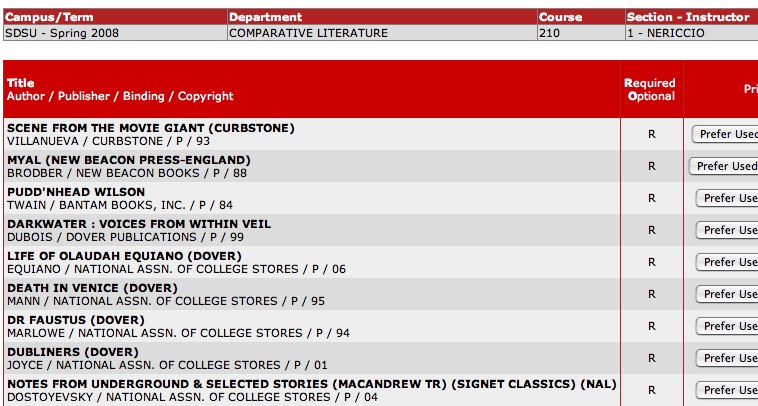 |
| Course menu |
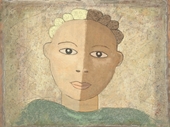 Tuesday | January 22, 2008 Tuesday | January 22, 2008
Comparative Literature, Cultural Studies, Nation, and Narration: A Primer
Today's class features an introduction to the seminar; a review of the
history of comparative literature as a discipline; a brief contrast of
English and American literary studies and comparative literature; and a
screening of the last 12 minutes or so of George Steven's Giant(1956) in preparation for next week's seminar.
Dr. William A. Nericcio
Chair & Professor of English and Comparative Literature
areas of research: Ethnic Studies, American Literature, Cultural Studies, Latin American Literature |
Tuesday | January 29, 2008
READINGS!!!
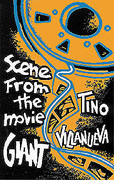 20th Century American Literature, Poetry, Film Studies, Allusion, and Psychology 20th Century American Literature, Poetry, Film Studies, Allusion, and Psychology
Reading/Screening Scene from the the Movie Giant by Tino Villanueva
Our first week of reading introduces us to contemporary American
Literature and the poetry of Tino Villanueva; however Villanueva's work
allows us to visit various literary enclaves simulataneously, so that
this seminar will also touch on the fields of Psychological narrative,
Chicano Literature, Latino/a Studies, Film Theory, 20th Century Cinema,
Poetry, and, most curiously, Autobiography. 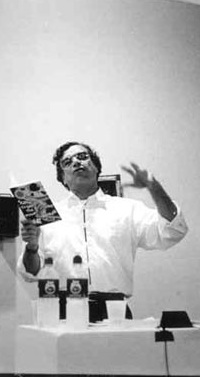 As
the book is short, read it twice: the first time straight through in
one sitting; the next, jumping around, reading the works OUT of the
order in which they were placed by the author. We may begin the
seminar with an in-class writing quiz (brief), so be sure to arrive in
class ON TIME. As you read be sure to remember that this peculiar
little book can be thought of as an odd "conversation"--a conversation
between a director, George Stevens, the mind behind Giant
the movie, and a poet, Villanueva, whose book, in a way, reacts to the
inventions of the American director and his ensemble of actors. As
the book is short, read it twice: the first time straight through in
one sitting; the next, jumping around, reading the works OUT of the
order in which they were placed by the author. We may begin the
seminar with an in-class writing quiz (brief), so be sure to arrive in
class ON TIME. As you read be sure to remember that this peculiar
little book can be thought of as an odd "conversation"--a conversation
between a director, George Stevens, the mind behind Giant
the movie, and a poet, Villanueva, whose book, in a way, reacts to the
inventions of the American director and his ensemble of actors.
William A. Nericcio
Chair & Professor of English and Comparative Literature
areas of research: Ethnic Studies, American Literature, Cultural Studies, Latin American Literature
|
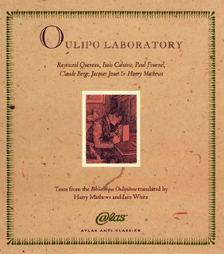 Tuesday | February 5, 2008 Tuesday | February 5, 2008
Oulipo, Uncreative Writing, and Intermedial Poetry
Dr. Joseph T. Thomas, Jr.
Areas of research: Children's Poetry, Cultural Studies, Theory, & Avant-garde/Innovative Writing & Aesthetics
Tonight we'll explore how linguist George Lakoff's notion of "the
radial category" can help us make sense out of that most frustratingly
fuzzy word, "Poetry." We'll take a whirl-wind tour through the world of
poetry, from the conventional to the limit cases (that is, from
Robert Frost's "Stopping by Woods on a Snowy Evening," to Man Ray's
untitled poem without a single word or letter). We'll listen to Raul
Hausman's raving sound poetry, count out Schwitter's numerical poems,
bear witness to the mute glory of Emmett Williams' concrete poetry
(click here
for a taste) and explore the conceptual poetry of Kenneth Goldsmith and
Ara Shirinyan (who, gods willing, will be joining us for a discussion
of several of his newly published unpublishable poems!).
Guest Poet: Ara Shirinyan
Required readings (to be completed before class) :
(online): Ara Shirinyan: 2005 Resolution
(online: PDF file): Ara Shirinyan: Speech Genres 1-2
(A click on the 2nd link will
take you to UBUWeb's unpublishable series: scroll down for Shirinyan,
Speech Genres, for another path to Shirinyan's work)
(online: web-page) Kenneth Goldsmith, essay, "Being Boring"
(First link takes you to online essay. Listen to Kenny read the essay, with slight changes, by clicking on 2nd link)
Not Required
Take a cruise around the Interweb's most amazing offering, a lovely
site that exists only to bring you the most amazing avant-garde and
innovative works ever produced by man, woman, and machine: U B U W E B!!!
The brain-child of Kenneth Goldsmith, this site contains works
copyrighted and copylefted, visual, aural, and textual. Violating the
law and decency, this site could disappear any day, as Kenny disregards
copyright law and uploads any text that strikes his fancy. Luckily for
him (and us), these works have no commercial value, so he's rarely sued
by the publishers who put out this work not to make a dime, but to push
aesthetic boundaries.
Joseph can be reached at jtthomas@mail.sdsu.edu
|
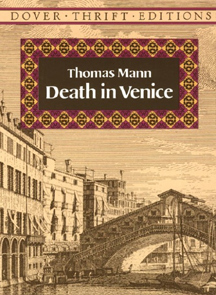 Tuesday | February 12, 2008 Tuesday | February 12, 2008
Psychological and Cultural Crises of Order in Thomas Mann's 'Death in Venice'
Dr. Ron Gervais
Professor of English and Comparative Literature
areas of research: American Literature, the psychological novel, German Literature
Please have all of Thomas Mann's Death in Venice read by
our class day, February 12. At the start of class, I'll give
you an impromptu essay topic to write on for 15-20
minutes. The topic will be an obvious one, if you've read
the book.
What I'd like you to notice and think about as you read
are two related topics: first, how the protagonist, Gustav
von Aschenbach, seems to be losing a grip on himself,
psychologically, as he goes on a vacation to Venice and
encounters there the beautiful Polish boy, Tadzio, with
whom he becomes secretly infatuated; and second, how the
whole city seems to be succumbing to a mysterious disease
whose existence is denied by the authorities. What is the
connection between the two? How is von Aschenbach's
secret infatuation connected to the official denial of
disease?
A specific detail to look for: notice the series of odd,
out-of-place "strangers" von Aschenbach encounters. How
are they related to him?
A general question to consider: how does von
Aschenbach's own personal disintegration seem also to
threaten the European "high culture" that he represents?
What I'm going to try to show you is how Death in
Venice, published in 1912, expresses a crisis in European
cultural consciousness, a breakdown of traditional ideas of
value, order, and meaning, on the eve of WW I (1914-
1918), a crisis and breakdown expressed through the
individual case of the novella's protagonist.
Ron Gervais
|
Tuesday | February 19, 2008
Ilya Kaminsky
Assistant Professor and Director, Master of
Fine Arts in Creative Writing
Reading as a Poet:
Comparative Poetics
areas of research: poetry, translation, aesthetics,
Shakespeare, creative writing
hot off the presses!
>Date: Tue, 12 Feb 2008 11:18:37 -0800 (PST)
>From: ilya kaminsky <ik001f@yahoo.com>
>Subject: for your class
>
>Hi Bill,
>
>this is just a little description of what I will do in
>your class next week.
>
>We will meet and talk about the ways to
>read contemporary poetry from around the world. How do
>poets read? How does their reading influence their
>craft? What are the examples of literary influence
>across the geographical borders? What is literary
>translation? What are metaphysics of translation &
>what lessons do writers learn from engaging in
>translation? What is ecstatic reading? We will attempt
>to answer these questions together.
>
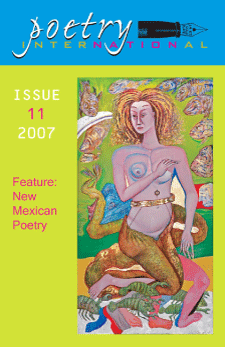 >I will provide hand-outs for our >I will provide hand-outs for our
>class discussion.
>
>a donation of $2 for hand-outs is
>appreciated, but not required.
>
>Thanks!
>
>
>Ilya Kaminsky
>Department of English & Comparative Literature
>San Diego State University
>5500 Campanile Drive
>San Diego, CA 92182-6020
>
>www.ilyakaminsky.com
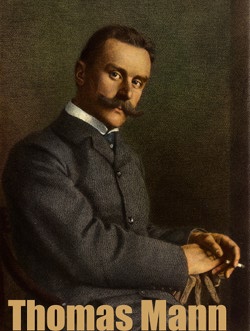 Ilya Kaminsky's lecture will take up the first Ilya Kaminsky's lecture will take up the first
hour of class; we will then adjourn for a ten-minute break. After
the break we will continue our discussion of DEATH IN VENICE, so do
please bring your books again!
Cheers,
Bill
WRITING ASSIGNMENT FROM A PREVIOUS EMAIL:
as
ilya kaminsky will be bringing your readings and only taking up the
first part of class, do please bring your copy of DEATH IN VENICE;
prepare for the second hour of class by selecting what you view to be
THE pivotal moment/paragraph /passage of the novel. Print this passage
out with your name and a brief outline of the reasons you think said
passage/paragraph/moment is SO key to a reading/understanding of Mann's
narrative experiment.
|
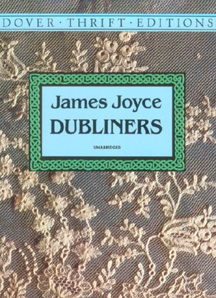 Tuesday | February 26, 2008 Tuesday | February 26, 2008
‘Priests, pedophiles and politicians: The Paralysis of Joyce’s Dubliners’
Assistant Professor Quentin Bailey
areas of research: British Literature, Romanticism, Wordsworth, Baudelaire, Fiction
Joyce's
Dubliners is a noxious stew of sexual, national, religious, and class
tensions, with characters who are frequently down-trodden and often
perverted. For this class, we'll focus on just over half of these
gritty tales:
The Sisters
An Encounter
Araby
Eveline
The Boarding House
Counterparts
Ivy Day in the Committee Room
Grace
The Dead
Please
read these attentively. In particular, ask yourself: 'What is wrong
with these people? Why do they behave in such weird ways? Who/ what is
responsible for their miserable lives?' There will be a short writing
exercise at the beginning of class related to these questions that will
- hopefully - lead us into a closer examination of the imperial,
religious, and capitalist forces that shape the lives of Joyce's
characters.
|
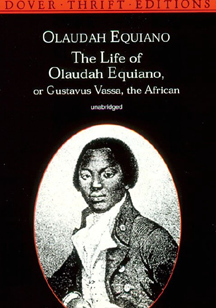 Tuesday | March 4, 2008 Tuesday | March 4, 2008
Trans-american Literature, African American Literature, Diasporic Literature
Unstable Identities in the Texts and Times of Olaudah Equiano
Dr. Emily Kugler
Lecturer, SDSU; PhD Program, UCSD
areas of research: British Literature, Transatlantic Literature
Try
to read all of the The Narrative by class. In particular, focus on the
Dedication, chapters 1-2, 5, 7, and 10. Come to class with short
written response (just 1-2 paragraphs) answering one of the following
questions:
 1).
Equiano is writing the Narrative in part to convince England that its
involvement in the slave trade is immorally, yet he seems to spend much
of the text praising England: do you think his anti-slavery goal is in
conflict with his complimentary treatment of his adopted country? 1).
Equiano is writing the Narrative in part to convince England that its
involvement in the slave trade is immorally, yet he seems to spend much
of the text praising England: do you think his anti-slavery goal is in
conflict with his complimentary treatment of his adopted country?
2)
How does he use his description of Africa in the opening chapters shape
the perspective of his largely white, middle-class, English readership?
3)
How does he position Turkey in relation to the other places he visits
(mainly England and the Americas)? Chapter 10 is a good place to focus
on for this question.
4) Find a contradictory moment in his
depiction of slavery. Assuming Equiano is an intelligent human being
who is editing his work, what could be a logical explanation on why he
would include this seemingly contradictory passage in his Narrative?
5) How does his conversion (one of many) in chapter 10 enable him to make England his permanent home?
|
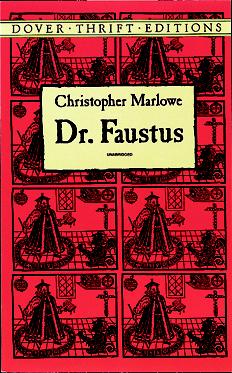 Tuesday | March 11, 2008 Tuesday | March 11, 2008
Drama, Theatre Studies, English Literature, Philosophy and Literature
Reading Christopher Marlowe's Dr. Faustus
Dr. Peter Atterton
Associate Professor of Philosophy
areas of research: Philosophy and Aesthetics, Continental Philosophy, Animal Rights, Deconstruction
In
this class we will be studying Christopher Marlowe’s Dr. Faustus
(Dover Thrift Edition). Before arriving to class on March 11, I would
like you to write a three page commentary about the work, based on the
following prompt:
The original title of Marlowe’s play is
The Tragicall History of D. Faustus. In his Poetics, Aristotle proposes
the classical definition of tragedy: a drama characterized by
seriousness and dignity, representing incidents arousing fear and pity,
involving a great and noble person, who experiences a reversal of
fortune (peripeteia) caused by a tragic “flaw” (hamartia),
which is not a character defect as much as a mistake of some kind.
According to this definition, would you consider Faustus a tragic hero?
Does he have heroic qualities? What is his tragic flaw? Does the comedy
of the play detract from the seriousness of the drama, or does it say
something significant about Faustus’s downfall? Does
Faustus’s eternal damnation provoke pity and/or fear in you?
Bring this typed, double-spaced, carefully written, dynamically titled masterwork with you to class for Tuesday to turn in.
During
our session we will be looking at Dr. Faustus in relation to three
issues: 1) The so-called “problem of Shakespeare
authorship” (I will be rehearsing some fascinating arguments
intended to show that Marlowe wrote many of the works attributed to
Shakespeare); 2) the transition from the medieval period to the
Renaissance in the European humanities; and 3) atheism—Marlowe
having the reputation of being the greatest atheist in Elizabethan
England.
|
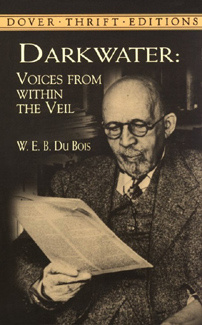 Tuesday | March 18, 2008 Tuesday | March 18, 2008
Biography, The Essay, American Literature, African American Literature, Ethnic Studies
Reading W.E.B. Du Bois
Dr. Edward J. Blum
Assistant Professor of History
areas of research: American History, African American Intellectuals, Race and Class
Students: Read Darkwater
by Du Bois. In addition, I would like each of you to write--and
bring to class --the following: one page (double spaced) on a passage
or selection that they found brilliant and interesting; and one page
(double spaced) on a passage or selection that they found boring or
confusing. They should bring the 2 pages to class and be prepared to
share and expand their thoughts, and turn this writing assignment in
for evaluation.
|
Tuesday | March 25, 2008
Dr. Stephen-Paul Martin
"Sudden Fiction as an International Response to the Absence of Time"
readings to be announced.
Lecturer 07-08, Associate Professor Fall 08, English and Comparative Literature
areas of research: fiction, the short story, comparative literature, the novel, experimental narrative
READINGS!
|
Tuesday | April 1, 2008

Spring Break
|
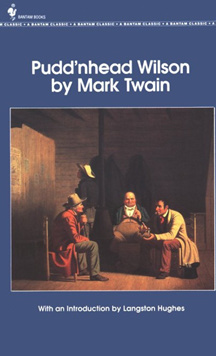 Tuesday | April 8, 2008 Tuesday | April 8, 2008
Divided at Birth: The Racially Contested Loyalties of the Infant Mark Twain
Reading Pudd'nhead Wilson
Dr. Mary Galbraith, Lecturer in English
Areas of research: childhood studies, children's literature, author studies, narrative theory, trauma theory
"Divided at Birth: The Racially Contested Loyalties of the Infant Mark Twain"
The Tragedy of Pudd'nhead Wilson has aptly been called an "awkward
concoction" because of its odd mix of narrative genres. But something
seismically important is happening in the midst of this awkwardness.
The book's most powerful narrative expresses the interior life of a
slave woman Roxana as she acts to save her child from his white
father/master and to reach her "promoted" child as his "demoted"
mother. Though it is hidden amid incongruous storylines about Italian
twins who may or may not be joined at the hip, babies born on the same
day, and fathers who have twin funerals, Roxana's heroic narrative
lingers behind the book and invites further exploration. In my lecture,
I will offer a speculative case linking the book's characters and plot
to the intimate early relationships and experiences of Sammy Clemens
(later to be known as Mark Twain).
Assignment:
1. Read Pudd'nhead Wilson and the following article--
"The Misunderstood Conclusion of Mark Twain's Pudd'nhead Wilson," by Christopher E. Koy
http://www.phil.muni.cz/angl/thepes/thepes_02_13.pdf
2. Write and bring to class an informal and spirited response to
Pudd'nhead Wilson, capturing your reading experience of three or four
specific moments at the beginning, middle, and end of the book.
A recent, related news story from the BBC
|
Tuesday | April 15, 2008
Dr. Edith Frampton
"Healing Betweens: The Hybrid Jamaican Riffs of Erna Brodber's Myal"
Lecturer, English and Comparative Literature
areas of research: British Literature, Post-Colonial Literature, Transatlantic Studies
Read: Myal, by Erna Brodber
Liste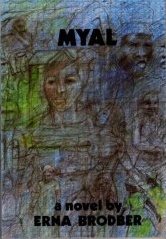 n to: 15-minute clip of Erna Brodber talking about and reading from Myal n to: 15-minute clip of Erna Brodber talking about and reading from Myal
Bring in: a passage from the novel and a song or a piece of music, as described below
This evening we will be considering how, within the Caribbean and
Jamaica in particular, there have been convergences and clashes of
various cultures, races, spiritual practices, languages, and musical
forms. The complex, often painful, and sometimes inspiring ways
in which various "hybrid formations" have evolved within the syncretic
island world of Jamaica are the focus of our book for tonight's class:
Erna Brodber's classic Caribbean novel, Myal. As you carefully
read this short novel, look for a passage that you find especially
intriguing. Next, think of a favorite song or piece of music that
you think resonates in some way with the passage that you've
chosen. Bring the song into class, on an iPod or a CD, and be
prepared to discuss briefly how it connects with the passage that
you've chosen from the book.
|
 Tuesday | April 22, 2008 Tuesday | April 22, 2008
Dr. Jerry Farber
On Dostoevsky's Notes from Underground (Signet edition; MacAndrew, translator)
Professor of English and Comparative Literature
areas of research: Comparative Literature, European Literature, Children's Literature, Literature and Aesthetics
A Mouse vs the Enlightenment: Dostoevsky's Notes from Underground
For this class I'd like you to read Notes from Underground in the
Signet edition (Andrew MacAndrew translation). You'll only need
to read Notes from Underground itself, not the other works, such as
Dream of a Ridiculous Man, that are included in that edition. On
April 22, during the first 15 minutes of class, you'll write an
in-class commentary about the work, based on a question or prompt that
I'll provide. These will be written without using the book; if
you've read the work attentively from beginning to end, you should have
no difficulty writing an acceptable commentary.
During this session we'll be looking at Notes from Underground in
relation to some issues in social and intellectual history that stretch
across the centuries: from the European Enlightenment in the eighteenth
century up to, not only the present moment but also the future that
we're hurtling into.
|
 Tuesday | April 29, 2008 Tuesday | April 29, 2008
Dr. David Kamper
Assistant Professor of American Indian Studies, SDSU
"Native Literature and Indians in Film: Sherman Alexie and the Western"
area of research: cultural studies, ethnic studies, Native American history
Most
of the images you have seen of American Indians—in
“Western” movies, museums, television
advertisements—have been created and controlled by
non-Indians. But American Indian artists have created amazing art
that engages and disrupts this history of misrepresentation.
Alexie’s work critically engages this history of
representation. A filmmaker and a fiction-writer, Alexie tries to
move beyond the Western’s standard tropes and at the same time
explore how these tropes have affected Indian peoples. We will be
looking at how these themes and his problematizing of the Western
translates across the various forms of expression Alexie uses:
poetry, essay, film, and fiction.
KAMPER READINGS! (10mb file--it will take time to download)
|
Tuesday | May 6, 2008
Final Class |
 |
|